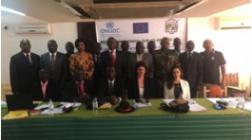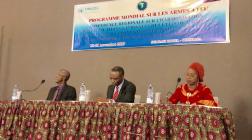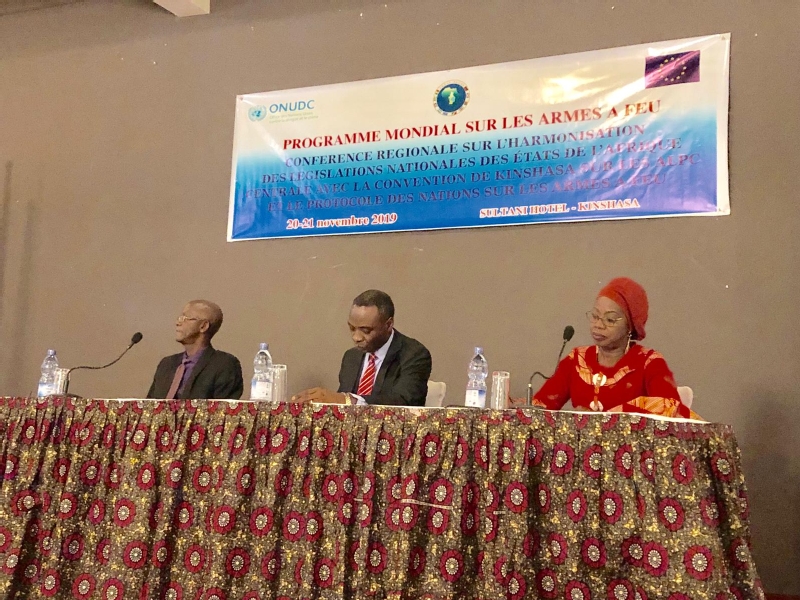
UNODC Regional conference for Central African countries on links between Kinshasa Convention on Small Arms and the Firearms Protocol
On 20-21 November 2019, UNODC, through its Global Firearms Programme (GFP), jointly with the Economic Community of Central African States (ECCAS) organized in Kinshasa, Democratic Republic of Congo, a regional conference for Central African countries aimed at analysing the synergies and complementarities between the Firearms Protocol and the Kinshasa Convention on Small Arms Light Weapons (SALW), but also other international instruments such as the Arms Trade Treaty, the UN Programme of Action on SALW and the Nairobi Protocol on SALW.. The activity was made possible with the financial support of the European Union.
The Kinshasa Convention entered into force in 2017 and since then there have been national and regional efforts aimed at supporting the implementation of the instrument. UNODC and ECCAS have seized this opportunity to analyse the need for harmonization of national legislation of arms in the sub region, given that several countries are parties not only to the Kinshasa Convention and the Firearms Protocol, but also to other international instruments such as the Arms Trade Treaty, the UN Programme of Action on SALW and the Nairobi Protocol on SALW.
National experts from eight Member States in the sub region also had the opportunity to present their existing national frameworks. The interactive approach of the conference facilitated the exchange of views and experiences of Member States on the obstacles encountered so far with the implementation of the international legal instruments on arms. These discussions helped to identify the specific technical assistance needs in terms of legislative development. Follow up actions to support current reform efforts in the countries were discussed. UNODC is in discussions with various countries in the sub region to see how it can support the development of updated and harmonized legislation. Since 2018 UNODC has been working with national authorities in Chad and in the Central African Republic on the drafting of updated laws and regulations.
The conference brought together representatives from Burundi, Cameroon, Central African Republic, Chad, Democratic Republic of Congo, Equatorial Guinea, Gabon and Rwanda. In addition, it also counted with expertise and advice of representatives from the Regional Centre on Small Arms (RECSA), UNREC and the United Nations Regional Office for Central Africa (UNOCA), which acts as the Secretariat of the United Nations Standing Advisory Committee on Security Questions in Central Africa (UNSAC), which is aimed at carrying out "reconstruction and confidence building activities among its Member States, including through confidence-building and arms control measures".
The project “Countering transnational illicit arms trafficking through the implementation of the United Nations Convention Against Transnational Organized Crime and its Firearms Protocol” has the overall objective to prevent and counter the illicit manufacturing of and trafficking in firearms, and their links to transnational organised crime and terrorism, through the ratification and implementation of the Protocol against the Illicit Manufacturing of and Trafficking in Firearms, their parts and Components and Ammunition, supplementing the United Nations Convention Against Transnational Organized Crime (UNTOC). The project is implemented by the Global Firearms Programme (GFP), established by the first project funded by the European Union (EU) (IFS /2010 /259-204), which builds upon five interconnected pillars, including: (1) adequate policy and legislative frameworks, (2) implementation of comprehensive firearms control and regulatory frameworks, (3) effective criminal justice responses to illicit trafficking and related crimes, (4) broad international cooperation and regular exchanges of information and expertise through communities of practitioners, and (5) enhanced knowledge and intelligence on firearms trafficking to monitor illicit trafficking flows.
The project’s outcomes aim at supporting these interconnected building blocks, and the activities programmed in order to achieve them include four outputs, namely: (1) increase awareness of the firearms issue and its international responses, and adequate policy and legislative frameworks in place, in line with relevant international and regional instruments; (2) increase capacities of countries and sub-regions to implement effective firearms control regimes in line with the Firearms Protocol and other relevant instruments, and to prevent, investigate and prosecute firearms trafficking and related offences through effective national response and international law enforcement and judicial cooperation; (3) support effective cooperation and sharing of information and good practices among communities of firearms and organised crime/terrorism practitioners, through regular contacts and use of specialised cooperation networks and platforms and taking advantage of existing initiatives; and (4) improve capacity to monitor, analyse and identify synergies for firearms legislation and case-law with and amongst other forms of transnational organised crime, including cybercrime, money laundering, illicit drug trafficking, smuggling of migrants, or terrorism, inter alia.







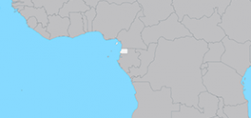



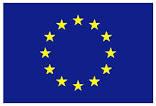
United Nations Office on Drugs and Crime – UNODC
Vienna International Centre, Room E1245
Tel.: (+43-1) 26060
E-mail: gfp@un.org
Point of Contact: Silvia de Pedro
Phone: (+43-1) 26060-83288
E-mail: silvia.depedro@un.org






